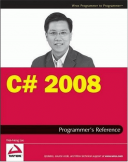Книга: C# 2008 Programmer
Logical Operators
Logical Operators
C# supports the use of logical operators so that you can evaluate multiple expressions. The following table lists the logical operators supported in C#.
| Operator | Description |
|---|---|
&& |
And |
|| |
Or |
! |
Not |
For example, consider the following code example:
if (age < 12 || height > 120) {
Console.WriteLine("Student price applies");
}
In this case, student price applies if either the age is less than 12, or the height is less than 120cm. As long as at least one of the conditions evaluates to true, the statement is true. Following is the truth table for the Or (||) operator.
| Operand A | Operand B | Result |
|---|---|---|
| false | false | false |
| false | true | true |
| true | false | true |
| true | true | true |
However, if the condition is changed such that student price applies only if a person is less than 12 years old and with height less than 120cm, the statement would be rewritten as:
if (age < 12 && height > 120) {
Console.WriteLine("Student price applies");
}
The truth table for the And (&&) operator follows.
| Operand A | Operand B | Result |
|---|---|---|
| false | false | false |
| false | true | false |
| true | false | false |
| true | true | true |
The Not operator (!) negates the result of an expression. For example, if student price does not apply to those more than 12 years old, you could write the expression like this:
if (!(age >= 12))
Console.WriteLine("Student price does not apply");
Following is the truth table for the Not operator.
| Operand A | Result |
|---|---|
| false | true |
| true | false |
Short-Circuit Evaluation
C# uses short-circuiting when evaluating logical operators. In short-circuiting, the second argument in a condition is evaluated only when the first argument is not sufficient to determine the value of the entire condition. Consider the following example:
int div = 0; int num = 5;
if ((div == 0) || (num / div == 1)) {
Console.WriteLine(num); //---5---
}
Here the first expression evaluates to true, so there is no need to evaluate the second expression (because an Or expression evaluates to true as long as at least one expression evaluates to true). The second expression, if evaluated, will result in a division-by-zero error. In this case, it won't, and the number 5 is printed.
If you reverse the placement of the expressions, as in the following example, a division-by-zero error occurs:
if ((num / div == 1) || (div == 0)) {
Console.WriteLine(num);
}
Short-circuiting also applies to the && operator — if the first expression evaluates to false, the second expression will not be evaluated because the final evaluation is already known.




